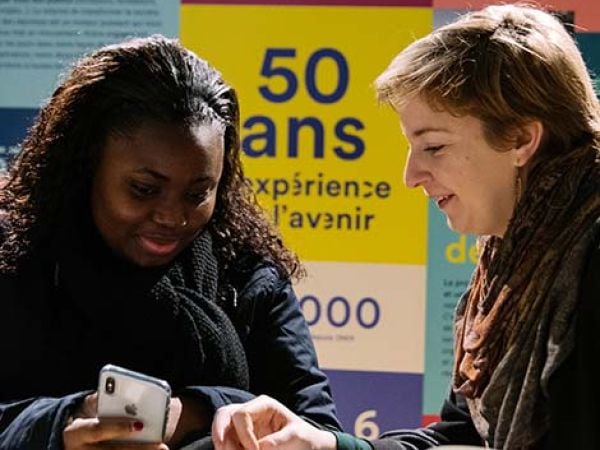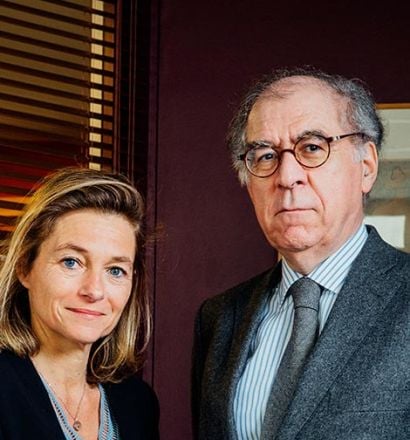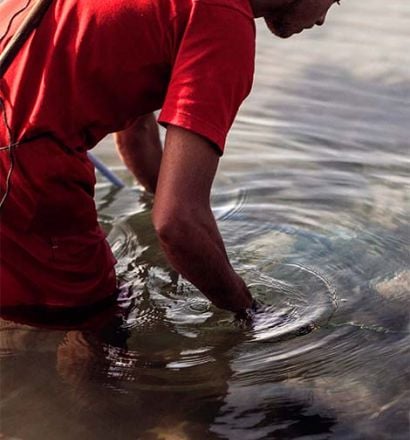A 50-year old history

Since its creation in 1969, Fondation de France has never flagged in its aim of developing a French model of philanthropy. By encouraging all those who wish to make a difference, it has contributed to genuine social progress.
A modern and original philanthropy model
The birth of Fondation de France is due to General de Gaulle and his culture minister, André Malraux, who both wanted to create a mechanism whereby individuals could contribute to charitable activities.
Their attention was drawn to one country, the United States, which at the time had 15,000 foundations, compared to France’s 250. Michel Pomey, one of Malraux’s advisers, visited the US to study the community foundation model, which unlike other nonprofits, addresses several causes in an area or community. Fondation de France was officially created by the decree of 9 January 1969.
Such were the premisses for building “French-style” philanthropy, which we have been developing for more than 50 years. This model is not restricted to the commitment of a few major sponsors. Rather, it brings together thousands of donors, founders, volunteers and grassroots organizations, intent on serving the public interest.
Mobilization for social progress
For more than 50 years, Fondation de France has tackled social issues that had previously not really been considered, from preserving the coast to combating early school leaving.
Here are few examples of charitable activities supported by Fondation de France for more than 50 years:
A 50-year old history
Timeline mobile (EN)

The first donor-advised funds appear. For example, the Salavin-Fournier couple creates a foundation that helps young people plan their future. Mrs Bloch, the widow of physicist Eugène Bloch wishes to award prizes recognizing the scientific work of students and researchers. Fondation Antoine Béclère is created as a result. The children of the famous physician, a pioneer in radiology and radiotherapy, set the foundation up, to promote scientific innovation in the field of medical imaging.

Fondation de France, with the support of Simone Veil, the then health minister, launches the first national campaign to combat loneliness in the elderly. The topic is analyzed and tangible solutions tested. They include support networks, transport services in rural areas, the development of home care, new housing options, support for carers and training for workers.


Two oil spills, the Torrey Canyon in 1967 and the Amoco Cadiz in 1978 off the coast of Brittany, reveal the fragility of marine ecosystems and lead to a public outcry. In 1975, Fondation de France creates the first Coastal Preservation program.

Fondation Salavin-Fournier creates the first DéclicsJeunes competition, to identify promising talent and offer help in bringing their nonprofit projects to life. Since it was created, the competition has made the dreams of more than 1,000 young people come true.

Fondation de France supports initiatives organized by social workers, which offer young people access to the world of work. These social enterprises are officially recognized in 1985.

Fondation de France sets itself the objective of facilitating the management and creation of more person-centered care homes for the elderly. It supports a number of temporary housing facilities and creates a “caring at home” scheme in the Aveyron department. It also publishes a report, Des lieux de vie jusqu'à la mort (Living spaces and end of life) which triggers the launch of a national campaign in 1984.

Over the years, Fondation de France extends its work to the development of palliative care and contributes to highlighting this major issue. Two laws follow, one on ensuring access to palliative care, the other on patients’ rights and the end of life, enacted on 9 June 1999 and 22 April 2005 respectively.

Suicide attempts, addiction, eating disorders and bullying are some of the hazards teenagers may face, requiring specific solutions and support. Which is why Fondation de France contributes to structuring this network of health centers providing advice and care for young people (“espaces santé jeunes”), now firmly established across France. Nowadays, adolescent medicine is a recognized discipline.

Nonprofits “Artistes contre le sida”, “Act Up-Paris”, “Aides-Fédération”, “Arcat-Sida” and a group of researchers created “Together against AIDS”. Fondation de France managed the fundraising drive for the first Sidaction event.

Fondation de France creates an observatory, to provide essential, reliable and comprehensive data on the nonprofit sector and to promote its development.

By encouraging new collaborations between researchers and practitioners, Fondation de France has contributed to breakthroughs in research on autism, with a better understanding of this condition and improved quality of life for those on the autism spectrum in France. This early commitment has contributed to autism being recognized by French government agencies, with the implementation of the first Autism Plan in 2005.

This organization, created by seven foundations including Fondation de France, brings together nonprofit professionals, to share best practices, organize interactions with government agencies and network, with a view to growing the nonprofit sector.

Fondation de France is actively engaged in assisting people affected by schizophrenia, bipolar disorder and severe depression, by encouraging coordination among professionals and also involving patients and their families.

Fondation de France stepped up and organized fundraising, as well as assisting the victims. Prompt and effective action in the face of emergencies is the result of experience accumulated since the 1970s, which has been reinforced over time. It provides assistance during the Sahel drought in 1973, in the refugee camps in Thailand in 1980, at the chemical plant explosion in France in 2001, during the earthquakes in Haiti in 2010 and in Nepal in 2015, in the wake of hurricane Irma in the Caribbean in 2017, the floods in France in 2018 and recently the explosion that ripped through Beirut in Lebanon in 2020.

Fondation de France is one of the very first organizations to support this pioneering experiment, in which long-term unemployed people are recruited into employment-oriented companies, at no extra cost to local authorities.

After the terrorist attacks in Paris on November 13, 2015, Fondation de France is approached by donors, especially in the US. It launches the “United Against Terrorism” fund to assist victims and also to set up projects that aim to prevent violence and radicalization.

In the aftermath of the destructive fire at Notre-Dame cathedral in Paris, Fondation de France is appointed one of the four organizations tasked with managing fundraising and allocating the donations from individuals and companies to rebuild this jewel of French heritage.

Faced with the pandemic, Fondation de France, AP-HP (Paris hospitals) and Institut Pasteur join forces in the “United Against the Virus” alliance, to support health workers, promote research and assist the most vulnerable people. More than 40 million euros is raised, thanks to individual donors and corporate engagement.

On August 4, an unusually violent explosion lays waste to the port of Beirut and part of the city, causing many victims. Thanks to its experience in emergency work and its network of local partners, Fondation de France immediately swings into action to support the most vulnerable residents and help with rebuilding the partly destroyed city.
Timeline mobile (EN)

The first donor-advised funds appear. For example, the Salavin-Fournier couple creates a foundation that helps young people plan their future. Mrs Bloch, the widow of physicist Eugène Bloch wishes to award prizes recognizing the scientific work of students and researchers. Fondation Antoine Béclère is created as a result. The children of the famous physician, a pioneer in radiology and radiotherapy, set the foundation up, to promote scientific innovation in the field of medical imaging.

Fondation de France, with the support of Simone Veil, the then health minister, launches the first national campaign to combat loneliness in the elderly. The topic is analyzed and tangible solutions tested. They include support networks, transport services in rural areas, the development of home care, new housing options, support for carers and training for workers.


Two oil spills, the Torrey Canyon in 1967 and the Amoco Cadiz in 1978 off the coast of Brittany, reveal the fragility of marine ecosystems and lead to a public outcry. In 1975, Fondation de France creates the first Coastal Preservation program.

Fondation Salavin-Fournier creates the first DéclicsJeunes competition, to identify promising talent and offer help in bringing their nonprofit projects to life. Since it was created, the competition has made the dreams of more than 1,000 young people come true.

Fondation de France supports initiatives organized by social workers, which offer young people access to the world of work. These social enterprises are officially recognized in 1985.

Fondation de France sets itself the objective of facilitating the management and creation of more person-centered care homes for the elderly. It supports a number of temporary housing facilities and creates a “caring at home” scheme in the Aveyron department. It also publishes a report, Des lieux de vie jusqu'à la mort (Living spaces and end of life) which triggers the launch of a national campaign in 1984.

Over the years, Fondation de France extends its work to the development of palliative care and contributes to highlighting this major issue. Two laws follow, one on ensuring access to palliative care, the other on patients’ rights and the end of life, enacted on 9 June 1999 and 22 April 2005 respectively.

Suicide attempts, addiction, eating disorders and bullying are some of the hazards teenagers may face, requiring specific solutions and support. Which is why Fondation de France contributes to structuring this network of health centers providing advice and care for young people (“espaces santé jeunes”), now firmly established across France. Nowadays, adolescent medicine is a recognized discipline.

Nonprofits “Artistes contre le sida”, “Act Up-Paris”, “Aides-Fédération”, “Arcat-Sida” and a group of researchers created “Together against AIDS”. Fondation de France managed the fundraising drive for the first Sidaction event.

Fondation de France creates an observatory, to provide essential, reliable and comprehensive data on the nonprofit sector and to promote its development.

By encouraging new collaborations between researchers and practitioners, Fondation de France has contributed to breakthroughs in research on autism, with a better understanding of this condition and improved quality of life for those on the autism spectrum in France. This early commitment has contributed to autism being recognized by French government agencies, with the implementation of the first Autism Plan in 2005.

This organization, created by seven foundations including Fondation de France, brings together nonprofit professionals, to share best practices, organize interactions with government agencies and network, with a view to growing the nonprofit sector.

Fondation de France is actively engaged in assisting people affected by schizophrenia, bipolar disorder and severe depression, by encouraging coordination among professionals and also involving patients and their families.

Fondation de France stepped up and organized fundraising, as well as assisting the victims. Prompt and effective action in the face of emergencies is the result of experience accumulated since the 1970s, which has been reinforced over time. It provides assistance during the Sahel drought in 1973, in the refugee camps in Thailand in 1980, at the chemical plant explosion in France in 2001, during the earthquakes in Haiti in 2010 and in Nepal in 2015, in the wake of hurricane Irma in the Caribbean in 2017, the floods in France in 2018 and recently the explosion that ripped through Beirut in Lebanon in 2020.

Fondation de France is one of the very first organizations to support this pioneering experiment, in which long-term unemployed people are recruited into employment-oriented companies, at no extra cost to local authorities.

After the terrorist attacks in Paris on November 13, 2015, Fondation de France is approached by donors, especially in the US. It launches the “United Against Terrorism” fund to assist victims and also to set up projects that aim to prevent violence and radicalization.

In the aftermath of the destructive fire at Notre-Dame cathedral in Paris, Fondation de France is appointed one of the four organizations tasked with managing fundraising and allocating the donations from individuals and companies to rebuild this jewel of French heritage.

Faced with the pandemic, Fondation de France, AP-HP (Paris hospitals) and Institut Pasteur join forces in the “United Against the Virus” alliance, to support health workers, promote research and assist the most vulnerable people. More than 40 million euros is raised, thanks to individual donors and corporate engagement.

On August 4, an unusually violent explosion lays waste to the port of Beirut and part of the city, causing many victims. Thanks to its experience in emergency work and its network of local partners, Fondation de France immediately swings into action to support the most vulnerable residents and help with rebuilding the partly destroyed city.




